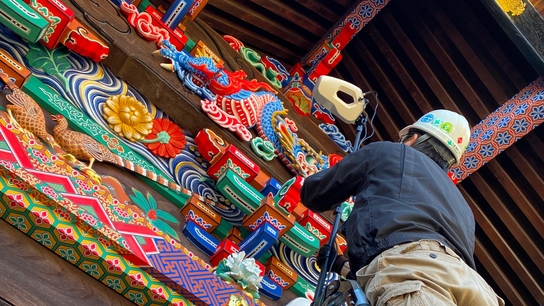Artec scanners were engaged in the making of “World War Z”
Summary: The VFX production team working on the movie World War Z needed to quickly and accurately create precise digital copies of more than 100 objects, including actors, props, vehicles, costumes, sets, and locations.
The Goal: To use two professional 3D scanners on location to digitally capture a wide range of objects, including actors' faces, bodies, weapons, clothing, and more. Average scan time per actor was less than 5 minutes.
Tool Used: Artec MHT, Artec L
2h3D Ltd, based near the Pinewood and Shepperton Studios in the UK, has a film and TV credit list stretching back 15 years. Their work includes Hollywood blockbusters and award-winning projects such as Doctor Who, Golden Compass, Harry Potter , Sherlock Holmes, to name a few. During "World War Z" pre-production, 2h3D was approached by the film's VFX department to discuss how they might assist in the digital capture of assets for the upcoming production, including sets and locations, bodies, costumes, vehicles and props. The company then worked alongside the VFX department at various locations in Malta, Hungary, Scotland, England as well as at Shepperton and Elstree Studios to deliver around 100 digital assets to be used in the flick.

‘World War Z’ is a horror film that recently premiered in movie theaters world-wide to rave reviews. The film, directed by Marc Forster, was based on the 2006 Max Brooks novel of the same name. The film stars Brad Pitt as Gerry Lane, a former UN investigator who must find a way to stop a zombie-like pandemic, traveling around the globe to fight this threat to humanity.
Artec scanners were used to digitize weapons, multiple baggage items for the plane crash scene, as well as actors and their elaborate costumes.





The process
For scanning, one Artec MHT (for heads/faces and props) and one Artec L (for bodies) were used, in conjunction with a motorized turntable. Capture of each performer took less than 5 minutes and head scans were done in less than a minute. Then, Artec Studio was used to process and edit the scan data before exporting the fused model into other software for processing and poly-sculpting.
2h3d allocated 2 days for processing/editing of each full body, including merging the higher resolution head scan with the body data. Sometimes this process took less time, sometimes more - it depended on how still the subject stood and how complex his/her outfit was.
We asked 2h3d why they settled on an Artec scanner. In addition to the quality of data, they were drawn to the systems for a number of reasons:
1) Portable. Both of their scanners (MHT + L) fit into a single, regular-sized camera bag taken aboard a plane as hand-luggage, so their equipment is never at the mercy of airport baggage handlers.
2) No complicated setup. No calibration before scanning and plug-n-play approach, allows them to start scanning as soon as they get to the set.
3) Large jobs are not a problem. The software is smart: it uses multi-thread and 64-bit processing. This means that it can deal with large amount of data.
4) Scans humans easily. Artec Studio comes standard with the "non-rigid alignment" feature. This algorithm helps the operator come up with a quality human-body scan even if the subject was moving during scanning.
5) Scans dark/black objects. 2h3d scanned close to 200 subjects in 5 locations. Each one was in a costume and the scanners were able to scan each one, regardless of their color or glare, as traditionally, 3D scanners have trouble scanning black and shiny objects.
6) Ambient light - not an issue. Unlike other scanners that 2h3d tried, Artec scanners are not bothered by ambient light. This means that they didn't have to build an expensive, special set for 3D scanning. This saved a lot of money and time.
Outcome
"Considering the quantity of scanning subjects, the numerous locations, the cramped areas we were expected to set up in and the often narrow set-up and capture window, Artec scanners were the only feasible option. With a plug-and-play USB interface and no calibration they are the perfect tool to use in the often chaotic world of film production. We were delighted with their usability in the field and the resultant data back at the studio, and we continue to utilize them heavily in all our feature production work." Says Guy Hauldren - Director - 2h3D Ltd. Head of Scanning for World War Z.
Scanners behind the story
Try out the world's leading handheld 3D scanners.




